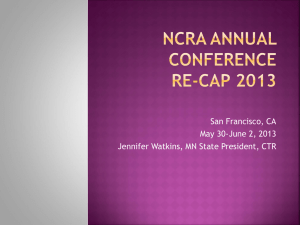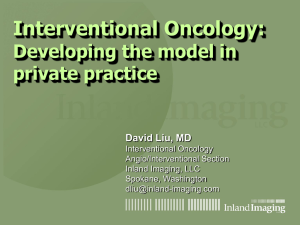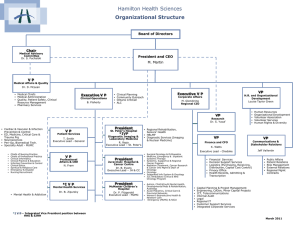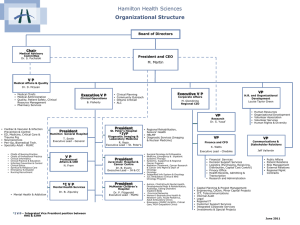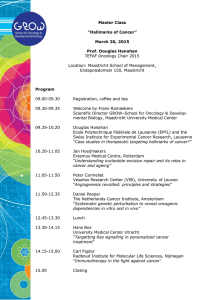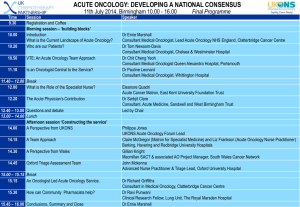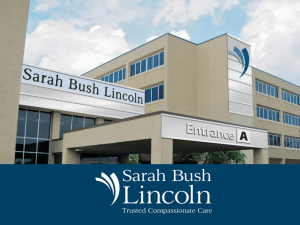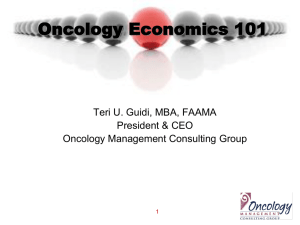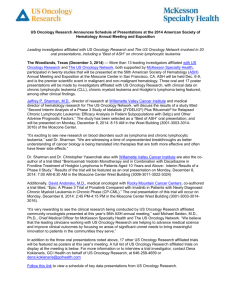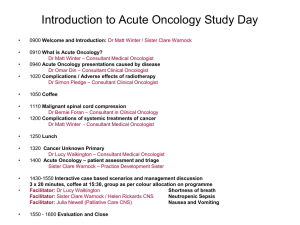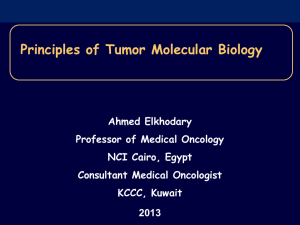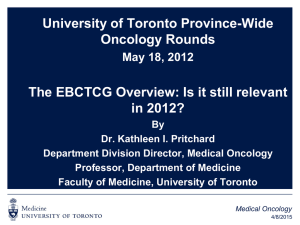File - KCL Oncology Society
advertisement
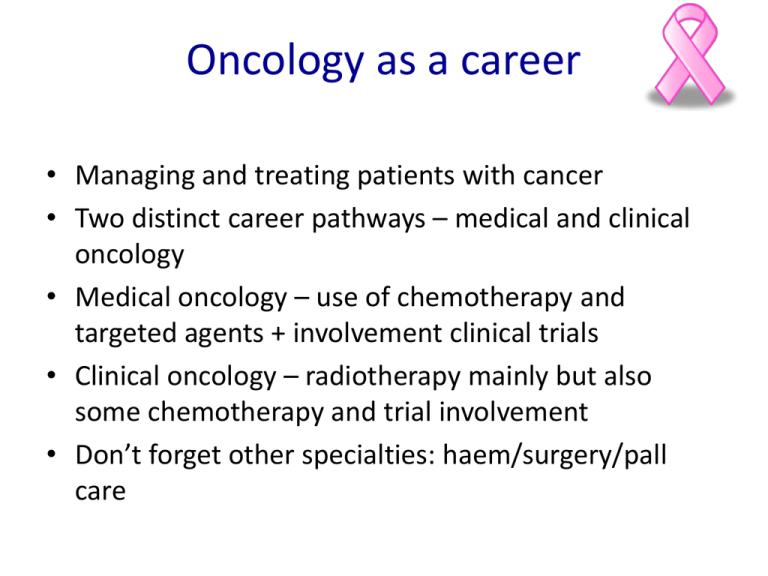
Oncology as a career • Managing and treating patients with cancer • Two distinct career pathways – medical and clinical oncology • Medical oncology – use of chemotherapy and targeted agents + involvement clinical trials • Clinical oncology – radiotherapy mainly but also some chemotherapy and trial involvement • Don’t forget other specialties: haem/surgery/pall care Good points to the job • High degree of patient involvement and management • Interesting and changing medical field – new developments occurring continually • Many opportunities to be involved in research • Rewarding Lung cancer: 1995 Advanced NSCLC Platinum doublet chemotherapy1 Median survival 7.9 months1 Best supportive care Lung cancer: 2009 and beyond Advanced NSCLC Wild-type EGFR NSCLC Squamous NSCLC Mutant EGFR NSCLC Non-Squamous NSCLC gefitinib5 Platinum doublet Chemo: not pem or bev1 Docetaxel2 monotherapy Pem-cisplatin doublet Chemo7 / carbo/taxol± bev8 Erlotinib3 monotherapy Erlotinib3 monotherapy Best supportive care Pemetrexed4 monotherapy Median survival 24.3 months6 Maintenance Difficult points to the job • High degree of patient involvement and management – can be intense! • Can be emotionally stressful • Hard work Personal qualities which make it enjoyable • Good communication skills • Interest in academic medicine • Enjoyment of working in multi-disciplinary teams • Commitment to the specialty including hard work, both clinically and academically • An ability to delegate and influence decisions as well as to make sound clinical judgements under difficult, emotional pressure Average day as an oncology registrar • Outpatient clinic – seeing new patients and patients undergoing treatment • Prescribing and planning new chemotherapy / radiotherapy • Ward based work – junior team + ward rounds / family discussions • Managing queries on patients and treatment from day unit • On-call overnight (from home) My week Monday Tuesday Wednesday Thursday Friday Ward round Journal club Lower GI clinic Upper GI MDM Upper GI clinic Course/admin Ward round HPB clinic Lower GI clinic Ward round Course Admin Medical oncology training pathway Competition Consider carefully the likely levels of competition involved and to be prepared to be flexible about choices 2011: CLINICAL ONCOLOGY – ST3 national training numbers TOTAL: 39 95 1:2.4 Competition 2011: MEDICAL ONCOLOGY – ST3 national training numbers TOTAL: 33 92 1:2.8 Academic Clinical Fellowships 2013 in London/KSS • Medical Oncology ST3+: – 3 posts: • Imperial College London at Hammersmith Hospital (1 post) • ICR and Royal Marsden (2 posts); UCL (1 post) • Clinical Oncology ST3+: – 1 post: • ICR and Royal Marsden The Good News MEDICAL SPECIALTY WORKFORCE FACTSHEET The chart above shows an expansion in the workforce since 1997, at an increasing rate of change during the past five years, and the supply of Medical Oncology consultants is forecast to increase during the next decade www.cfwi.org.uk/.../medical-oncology...medical.../attachment. Academic training 2 pathways -Most medical oncology trainees complete PhD degrees -MSc. In oncology also during registrar years (everyone) -2 pathways - ‘normal’ training number, OOP for MD/PhD - NIHR Academic Clinical Fellowship (ST3 onwards for medical oncology) Academic Pathway FY 1 & 2 Academic foundation programme in oncology ST 1 & 2 Core medical c training + MRCP ST 3, 4 & 5 Specialist training in oncology + specialist exam Not required for entry into later academic programme but an advantage N.B in some deaneries run-through programmes are available + Cambridge integrated system PhD or completion of training Academic Training • Academic training available in oncology in foundation years (FY1 and 2) • Then can continue from ST3 after completing core medical training • Designed to allow doctors to gain experience of research (though some already have experience • Involves one block of 4months research in foundation years • Then 3 months each year during specialist oncology training - (~3 available in London/yr) • Designed to work up to starting a PhD (though most non-academics also complete PhD’s) Building CV… • • • • • • • FY/ST job in oncology/haematology Case reports Audit Poster presentations Clinics MRCP Trust oncology post Our pathways • Research degree prior to medicine, then academic medical oncology training • ACF medical oncology • ‘Normal’ registrar, taken time out for PhD Further info on academic programmes at • http://www.stfs.org.uk/tfs-academic-foundationprogramme-recruitment • http://www.londondeanery.ac.uk/var/recruitment/a cademic-training/vacancies/medical-oncology-st3acf-2001 Related links – Joint Royal Colleges of Physicians Training Board http://www.jrcptb.org.uk/trainingandcert/ST3SpR/Pages/Oncology.aspx – London Deanery http://www.londondeanery.ac.uk/specialtyschools/medicine-and-medical-specialties – Association of Cancer Physicians http://www.cancerphysicians.org.uk/ – Academic training http://www.nihrtcc.nhs.uk/intetacatrain/
